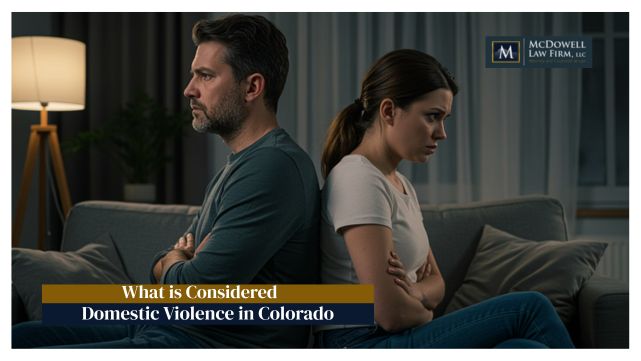Being accused of domestic violence is a scary situation that can turn your world upside down but there can be a chance that domestic violence charges dropped. On the other side, the consequences can include jail time, probation, therapy, and a lifetime criminal record, are overwhelming. Beyond that, there can be repercussions at your job, child custody, ability to rent, firearm ownership, and more. Fear, confusion, and loneliness are common feelings during this difficult time.
You’re not alone! Colorado’s Domestic Violence laws are tough, but you can fight for your rights. Guess what? It is possible to get your DV charges dismissed.
Are you facing domestic assault charges in Colorado and have no idea how to get them dropped? In this post we’ll cover strategies and information on ways to get domestic violence charges dismissed, or how to improve your chances at a fair resolution.
What Is Domestic Violence?
Domestic violence is a pattern of violent behavior people do at home. Here one spouse uses the other to get or maintain power over another intimate partner. It can be sexual, emotional, financial, physical, psychological or technological abuse of another person or accusations of abuse or other controlling behavior. This includes all behaviors that frighten, intimidate, retaliate, molest, isolate, scare, threaten, force, injure or wound someone.
This type of behavior can happen to anyone, regardless of race, age, sexual orientation, religion, sex, or gender identity. It can happen to people from all walks of life and all levels of education. It can happen in opposite-sex and same-sex relationships, to intimate partners who are married, living together, dating, or have a child. We are an LGBTQ-friendly law firm that welcomes all clients.
The effects of domestic assault aren’t just for the person being abused. It affects their family, friends, coworkers, other witnesses, and the community. Children who see domestic violence as they grow up are particularly vulnerable to the crime. Kids who are exposed to violence in the home frequently have social and physical problems. Some of them even think violence is a normal way of life.
Some common forms of domestic violence are:
- Physical abuse: Hitting, kicking, biting, choking or using weapons. (Assault).
- Emotional abuse: Insults, criticism, blaming, gaslighting or isolating the victim from friends and family. (often charged as Harassment or Stalking)
- Sexual abuse: Forcing unwanted sexual contact, rape or sexual assault.
- Psychological abuse: Threats, intimidation, stalking or destroying the victim’s property.
What Are The Penalties For A Domestic Violence Conviction?
The consequences of domestic assault charges vary. Being charged with a domestic violence offense is scary, dangerous, and confusing. You are on your own in the court system. You are one of the hundreds of people at court that day that will go through that process. Don’t go it alone. An experienced domestic violence lawyer can walk you through the process to know what to say and do, and what your best options are.
Most of the time your only question is, “What’s the worst that could happen if I get convicted?”
The biggest concern we hear from our clients is more jail time and/or losing their job. The next question that comes to mind is – “How to get domestic violence charges dropped.”
Before we get to that, let’s talk about the penalties for domestic abuse convictions in Colorado:
1. Mandatory Provisions
Colorado domestic violence law has specific requirements for convicted individuals. These requirements are to protect victims and hold offenders accountable.
The court requires the convicted person to follow specific conditions. These conditions often include no contact with the victim (or at least no “bad contact”). This means if the protection order is modified to allow contact, you are prohibited from intimidating, retaliating, harassing, annoying, or molesting the alleged victim. This is true even while the case is pending before it has been resolved. In Colorado, we call that an 18-1-1001 protection order that will continue for the duration of the case. Either until the case is dismissed, or you finish your probation period.
A DV conviction will also include counseling or therapy and community service. If you violate these mandatory requirements your penalties and jail time will increase.
The court may also order the offender to participate in violence awareness programs or anger management classes. These programs are to educate about domestic assault and provide behavior modification tools.
2. Domestic Violence Evaluation and Treatment
Colorado convicted domestic violence offenders must be evaluated to determine their risk of reoffending. This evaluation helps to determine the level of therapy and monitoring.
Based on the results of the evaluation the court may order the offender to attend a domestic violence treatment program. These programs address underlying issues such as anger management, substance abuse, and interpersonal skills.
Completing the required treatment program is often a condition of probation or parole. Failure to complete the program will result in more fines.
3. Fines/Fees
A domestic violence conviction in Colorado usually involves financial penalties. The court imposes fines as punishment and to prevent future offenses.
In addition, you may be responsible for court costs, victim compensation fees, and other related charges. These fees can be devastating to your financial situation. The fines and fees vary depending on the offense and the offender’s criminal history.
4. Mandatory Protection Order
To protect victims of domestic abuse the court orders a mandatory protection order. The injunction prohibits you from contacting the victim. This is called an 18-1-1001 mandatory protection order.
The protection order outlines specific conditions such as staying away from the victim’s home, office, and other designated locations. It may also prohibit the perpetrator from having guns, and require relinquishment. Violating a protection order is a serious offense with serious penalties including jail time.
5. Jail or Prison Time
The nature of the offense and the offender’s criminal history determine the length of the sentence in Colorado. Misdemeanor domestic violence offenses can result in jail time. Felony convictions can result in jail as a condition of probation, or in prison time. The length of the sentence depends on the charges. Keep in mind the court may impose a minimum or a mandatory sentence for certain offenses.
The charges will let you know whether you have a felony or a misdemeanor charge against you. If a case is listed as a CR case, that means there is at least one felony count in your case. This typically is written as “Year-CR- Case number”. For example, 24CR1234. A misdemeanor is the same way, but with an “M”. Example: 24M1234.
What Is Colorado’s Policy On Arrest In Domestic Violence Cases?
Colorado takes domestic abuse very seriously. The state has a mandatory arrest policy. That means if a police officer responds to a domestic violence call and determines there is probable cause to believe a crime occurred, they must arrest the suspect. No exceptions.
Several factors will indicate to the police that they have enough information to believe a crime occurred. Under Colorado Revised Statute § 18-6-803.6 the officer doesn’t need exact proof. The policy is to protect victims and prevent future harm. But even with a mandatory arrest, the case can be still ultimately be dismissed. This happens when the prosecutor decides there isn’t enough evidence to move forward.
A domestic violence arrest can be devastating. If you are charged with a domestic assault crime the justice system will take control of your life. Once convicted you may face jail time, fines, and a criminal record. Additionally, the court may impose a protection order prohibiting you from contacting the victim.
A domestic violence conviction can also affect your ability to get work, housing, and professional licensing. You can lose custody of your children and face these consequences for years to come.
If you or your loved one is being arrested for domestic violence in Colorado call an attorney now. The first step is to understand the situation and get legal help. A skilled criminal defense attorney will help you know your rights, build a defense, and navigate the system.
Can Domestic Violence Charges Be Dropped?
Just because a victim recants, or asks to dismiss a case, it doesn’t mean the DAs will agree. Essentially, the DA decides what happens to the charges up until trial. Even if the accused victim wants to drop the charges the prosecutor can continue the case.
But there are ways to handle this. A skilled criminal defense attorney can look at several legal options to contest and drop the case. These may include:
- Insufficient evidence: The prosecution has the burden of proof to prove your guilt beyond a reasonable doubt. That’s a high standard that requires strong evidence to support the charges. If the prosecution can’t meet that standard they haven’t convinced the jury or judge that you are guilty beyond a reasonable doubt. In that case, the charges can be dismissed.
Your attorney will review the prosecution’s evidence and find the holes in the case. These may include inconsistent witness testimony, lack of physical evidence, or no corroboration. That way your attorney can challenge the prosecution’s narrative.
- Challenging the Evidence: Law enforcement has to follow strict rules when collecting evidence. If your attorney finds illegally obtained evidence such as an unlawful search or seizure the evidence will be suppressed. That means you can’t use that evidence against you in court and it weakens the prosecution’s case big time.
- Identifying inconsistencies: Even the strongest cases have weaknesses. Your attorney will review the prosecution’s evidence including witness statements. Inconsistencies can raise doubt about the accuser or other witnesses.
Who Can Drop Domestic Violence Charges? Can the Judge, Victim Or Prosecutor Dismiss the Case?
In Colorado, the state charges the defendant. So only the prosecutor can drop the charges, not the victim or the defense attorney. If your case qualifies for a preliminary hearing (certain felonies), the Judge could determine that there is not probable cause to proceed with the charges.
The prosecutor can go forward with the case even if the victim recants their statement. This is to hold the perpetrator accountable and prioritize the victim’s safety. The idea is that many couples go through a cycle of violence, and continuing to prosecute the case over the victim’s objections, is to promote victim and community safety.
How do I get domestic violence charges dropped?
While it is true that a strong case by the prosecution can certainly increase the chances of a conviction. But it’s not a guarantee. A skilled domestic abuse attorney has ways to challenge the state’s evidence and poke holes in their case. They can review the prosecution’s evidence for inconsistencies or flaws and find weaknesses.
Why can’t victims just drop the case in Colorado?
In non-domestic cases, I have found that prosecutors are more likely to drop cases where the victim does not wish to proceed. In DV cases, prosecutors understand that many cases have a dependent dynamic based on their relationship and financial or co-parenting status. It’s because of these complicated dynamics that are present in domestic abuse cases. In some cases, the victims feel bullied or forced into dropping the charges.
The reasoning behind this is varied. The goal is to protect the victim from further harm by taking away their decision-making ability. Domestic violence is a pattern of behavior, and victims may fear retaliation if they press charges. What is sometimes called a “no-drop” policy, breaks that pattern by ensuring the legal process moves forward even if the victim doesn’t want to cooperate.
While the no-drop policy is well-meaning, it’s not without its critics. Some say it can make victims relive the situation and cause more psychological harm. Additionally, there’s a legitimate concern greater risk of false convictions.
How Can A Criminal Defense Attorney Help You?
Are you wondering how to get domestic violence charges dropped? It’s a tough terrain to navigate but you can beat the allegations with the right strategy. How? Check out below to find out:
1. Legal Know-How and Experience
A criminal defense attorney has in-depth knowledge of criminal law, procedure, and case law. That’s important to navigate the legal system and understand your case. Their experience with similar cases allows them to anticipate the challenges, develop a strategy, and build a defense.
2. Thorough Investigation and Evidence Collection
A good defense attorney will do a thorough investigation to find all the facts and evidence. He will interview the witnesses, examine the crime scene, review police reports, and gather additional evidence for your defense.
By reviewing the prosecution’s case they can find holes and inconsistencies to challenge the allegations against you.
3. Develop a Defense Strategy
A good attorney will develop a defense plan based on the facts and your case. They will review the charges, defenses, strengths, and weaknesses. A strategic approach like that will help present a strong argument to the judge or jury and get you a better outcome.
4. Negotiation and Plea Bargaining
A good defense attorney can often negotiate a plea bargain with the prosecution. That means agreeing to reduced charges or a shorter sentence in exchange for a guilty plea.
A knowledgeable attorney can evaluate the pros and cons of a plea bargain. They can also help you make informed decisions about your case.
5. Court Representation
If your case goes to trial a criminal defense attorney will be your voice in court. They will question witnesses, present evidence, and argue to the judge or jury.
An experienced domestic violence attorney in Colorado will fight to obtain a not guilty verdict if the case proceeds to trial. They can find the holes and create reasonable doubt in the jurors’ minds.
6. Your Rights and Interests
A criminal defense attorney will protect your rights and interests throughout the process. A good attorney will make sure you’re treated fairly and will protect your constitutional rights.
You’ll also be advised of what’s at stake in your case. A knowledgeable attorney will give you peace of mind and help you navigate the complex legal system.
7. Explore Alternative Resolution
There isn’t only one way to handle a DV case. It’s good to be creative and explore alternative resolutions to cases. In El Paso County, we have a program called a pre-plea investigative report (PPIR). If you complete the PPIR with a good result, the DA may choose to dismiss the charges, or offer a much more favorable resolution or plea.
Contact A Colorado Domestic Violence Attorney Now!
Now that you know it is possible to get domestic violence charges dismissed in Colorado it’s time to act. Facing domestic violence charges is overwhelming and scary. In Colorado, the legal system takes these allegations seriously.
A domestic violence conviction has severe consequences. It can affect your reputation, employment, and personal relationships. So it’s important to seek legal help immediately from a Colorado domestic violence attorney.



